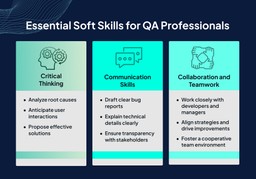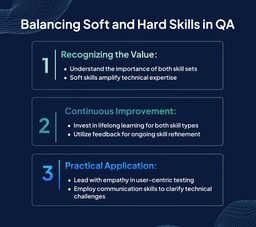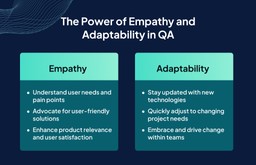Welcome to the Quality Assurance (QA) world, where every line of code undergoes meticulous scrutiny to ensure software testing excellence!
Did you know that in 2022, approximately 1.63 million software developers and QA professionals were diligently working across the United States?
That number is projected to surge to a whopping 2 million by 2032! Impressive.
But here’s the catch: amidst the ever-growing tech landscape, the importance of soft QA skills cannot be overstated. Sure, technical prowess is essential, but the ability to communicate effectively, collaborate seamlessly, and adapt swiftly are the real game-changers in this dynamic field.
So, if you’re eyeing a successful career trajectory in QA, undertaking a QA course isn’t just beneficial—it’s downright essential.
Join us now as we delve into why nurturing these QA soft skills is your golden ticket to conquering the QA realm and propelling your career to new heights!
General QA Tester Skills
The field of QA is projected to witness a remarkable surge, with job opportunities expected to grow by a staggering 25% from 2022 to 2032.
But to break into the QA market, you’ve got to have the essentials in your pocket brain:
Navigating the Software Development Lifecycle (SDLC)
Picture yourself as the captain of a ship, charting a course through the tumultuous waters of software development. Understanding the twists and turns of the software development life cycle—from requirements gathering to deployment—empowers you to steer your testing efforts with precision and purpose.
Mastering Testing Techniques and Methodologies
Think of yourself as a detective, uncovering clues and solving mysteries within the code. With a repertoire of testing techniques at your disposal—like black-box, white-box, and exploratory testing—you’re equipped to unravel the complexities of the software and unveil its hidden truths.
Harnessing the Power of Automated Testing
Imagine having an army of tireless robots at your command, ready to execute your testing commands at lightning speed. With automation tools like Selenium and Appium in your toolkit, you can automate repetitive tasks, blitz through regression testing, and conquer new horizons in efficiency.
Defeating Defects with Precision and Panache
Every defect is a foe to be vanquished, and you’re the valiant hero leading the charge. Armed with your trusty defect management tools—Jira, Bugzilla, or HP Quality Center—you document, prioritize, and track down bugs with the finesse of a seasoned warrior.
Unlocking the Secrets of Databases with SQL Sorcery
Delve into the depths of data like a modern-day alchemist, wielding the magic of SQL queries to manipulate and verify the integrity of your databases. With a flick of your SQL wand, you ensure that your software’s data remains pure and untarnished.
Conquering Cross-Browser and Cross-Platform Chaos
Picture yourself as a fearless explorer, venturing into the territories of web and mobile platforms. With cross-browser and cross-platform testing, you tame the wilds of compatibility, ensuring that your software thrives in every environment it encounters.
Embracing Continuous Integration and Deployment (CI/CD)
Ride the wave of continuous innovation like a seasoned surfer, riding the crest of CI/CD pipelines to deliver software updates with speed and precision. With tools like Jenkins and Git as your surfboard, you catch the rhythm of rapid deployment and ride it to success.
Unleashing Performance Testing Prowess
Become a virtuoso of velocity, stress-testing your software to the limits and beyond. With tools like JMeter and LoadRunner as your instruments, you orchestrate symphonies of scalability, ensuring that your software performs flawlessly under the heaviest of loads.
Fortifying Software Security with Vigilance and Valor
Stand as a stalwart guardian against the forces of cyber-threats, defending your software’s integrity with sword and shield. With security testing tools like OWASP ZAP and Burp Suite, you probe for vulnerabilities and shield your software from the ravages of malicious intent.
Crafting a Quality Legacy with Technical Mastery
Your mission is clear: to leave a legacy of quality and excellence in your wake. With each technical skill mastered and each testing challenge overcome, you forge a path to greatness, shaping the future of software one line of code at a time.
What Soft Skills Does a QA Tester Need?
Let’s dive deeper into the essential QA skills that make a Quality Assurance (QA) tester not just good, but exceptional at their craft.
Attention to Detail
QA testers are the gatekeepers of software quality, meticulously combing through every nook and cranny of an application to unearth even the tiniest bugs.
Their keen eye for detail ensures that no glitch goes unnoticed, contributing significantly to the product’s overall reliability and user satisfaction.
Critical Thinking
Beyond just identifying issues, QA testers need to analyze root causes, foresee potential complications, and propose effective solutions.
This requires sharp critical thinking skills to navigate complex systems and anticipate how users might interact with the software in real-world scenarios.
Communication Skills
As the liaison between development teams and end-users, QA testers must articulate their findings clearly and concisely.
Whether it’s drafting comprehensive bug reports, explaining technical concepts to non-technical stakeholders, or collaborating with cross-functional teams, effective communication is key to ensuring everyone on the team is on the same page.
Collaboration and Teamwork
QA testing is rarely a solo endeavor. Testers often work very closely with developers, project managers, designers, and other stakeholders to align priorities, discuss strategies, and drive continuous improvement.
Being a team player, open to feedback, and capable of building strong working relationships is essential for success in this collaborative environment.
Adaptability and Learning Agility
In the fast-paced world of software development, technologies, and methodologies evolve at breakneck speed. QA testers need to stay abreast of the latest industry trends, tools, and best practices, constantly working on their skills and adapting to new challenges. A growth mindset and a willingness to embrace change are invaluable assets in this ever-changing landscape.
Empathy and User Advocacy
Ultimately, the goal of QA testing is to deliver a product that delights users. Testers must empathize with end-users, understanding their needs, preferences, and pain points to advocate for a seamless and intuitive user experience.
By putting themselves in the shoes of the end-user, QA testers can uncover insights that drive product improvements and enhance customer satisfaction.
How to Find a Balance Between Soft and Hard Skills as a QA
Balancing soft and hard QA skills is a delicate dance for Quality Assurance (QA) professionals, as both are essential for success in the field. Here’s how to find that equilibrium:
Acknowledge the Importance of Both
Recognize that while hard skills like technical proficiency are crucial for executing QA tasks, soft skills such as communication and teamwork are equally vital for effective collaboration and problem-solving.
Invest in Continuous Learning
Stay abreast of the latest developments in both technical and soft skill domains. Enroll in courses, attend workshops, and seek out opportunities for professional development to continuously hone your QA skills and stay ahead of the curve.
Seek Feedback and Self-Reflection
Solicit feedback from peers, managers, and stakeholders to identify areas that need improvement in both your technical and soft skills. Engage in regular self-reflection to assess your strengths and weaknesses and set actionable goals for growth.
Practice Empathy and User-Centricity
Embrace the perspective of end-users and stakeholders, putting yourself in their shoes to better understand their needs/requirements, preferences, and pain points. By prioritizing empathy and user-centricity, you’ll not only improve the quality of your work but also enhance collaboration and communication with others.
Foster a Collaborative Environment
Cultivate a culture of collaboration and knowledge sharing within your QA team and across departments. Encourage very open communication, active listening, and mutual respect to maximize the diverse strengths and perspectives of team members.
Embrace Cross-Functional Collaboration
Collaborate closely with developers, project managers, designers and other stakeholders throughout the software development lifecycle. By closing the gap between technical and non-technical roles, you’ll gain valuable insights, foster stronger relationships, and drive better outcomes for the project as a whole.
Prioritize Adaptability and Flexibility
Remain flexible and adaptable in the face of changing project requirements, priorities, and deadlines. Embrace new technologies, methodologies, and approaches with an open mind, and be willing to pivot and iterate as needed to meet evolving needs and challenges.
Lead by Example
Demonstrate the value of both soft and hard skills through your actions and behavior. Lead by example by effectively communicating, collaborating with others, and delivering high-quality work that reflects a balance of technical proficiency and interpersonal effectiveness.
Steps into Building Your Soft Skills as a QA
Building soft skills as a Quality Assurance (QA) professional is an ongoing process that requires dedication, practice, and a commitment to personal growth.
Here are some steps to help you strengthen your soft skills in the QA domain:
Identify Areas for Improvement
Are you struggling with communication, collaboration, time management, or something else? Pinpointing specific areas for improvement will help you focus your efforts effectively.
Set Clear Goals
Establish clear, measurable goals for improving your soft skills. Whether it’s improving your ability to communicate effectively with team members, enhancing your problem-solving skills, or becoming a more empathetic listener, setting concrete goals will provide a roadmap for your development journey.
Seek Feedback
Solicit feedback from colleagues, supervisors, and stakeholders to gain insight into your strengths and areas for improvement. Constructive feedback can help you pinpoint blind spots, recognize patterns of behavior, and pinpoint specific areas where you can focus your efforts for growth.
Practice Active Listening
Cultivate the habit of active listening by fully engaging with others during conversations, meetings, and discussions. Focus on understanding the speaker’s perspective, asking clarifying questions, and providing thoughtful responses that demonstrate empathy and comprehension.
Develop Empathy
Empathy is a critical soft skill for QA professionals, as it enables you to better understand the needs, concerns, and perspectives of stakeholders and end-users. Practice putting yourself in others’ shoes, considering their feelings and experiences, and responding with understanding.
Enhance Communication Skills
Effective communication is important for success in QA, whether you’re drafting bug reports, providing feedback to developers, or collaborating with cross-functional teams. Work on honing your written and verbal communication skills, paying attention to clarity, conciseness, and tone.
Collaborate Across Teams
Actively seek out opportunities to collaborate with colleagues from different departments and disciplines. By working with developers, designers, project managers, and other stakeholders, you’ll gain valuable insights, broaden your perspective, and strengthen your collaborative skills.
Take Advantage of Training and Development Opportunities
Attend workshops, seminars, and training sessions focused on soft skills development. Look for courses and resources specifically tailored to QA professionals, covering topics such as communication, leadership, conflict resolution, and emotional intelligence.
Practice Self-Reflection
Regularly reflect on your experiences, interactions, and achievements to assess your progress and identify areas for further growth. Consider keeping a journal to track your development journey, noting successes, challenges, and lessons learned along the way.
Stay Open to Feedback and Adaptation
Remain open to feedback from others, and be willing to adapt your approach based on the insights you receive. Embrace a growth mindset, viewing challenges as opportunities for learning and improvement, and approach each day as an opportunity to grow and evolve as a QA professional.
A Path to Data Career Success with Syntax Technologies
The journey into the world of Quality Assurance is dynamic and rewarding. The fusion of technical expertise and soft QA skills creates a potent formula for success.
At Syntax Technologies, we understand the importance of equipping aspiring QA professionals with the tools and knowledge they require to excel in their careers.
That’s why we’re proud to offer a comprehensive QA course designed to provide hands-on training in testing methodologies, automation tools, and much more.
With our expert instructors and immersive learning environment, you’ll gain the practical skills and real-world experience needed to launch your career confidently and competently.
Enroll now and pave your way to a successful QA career!




